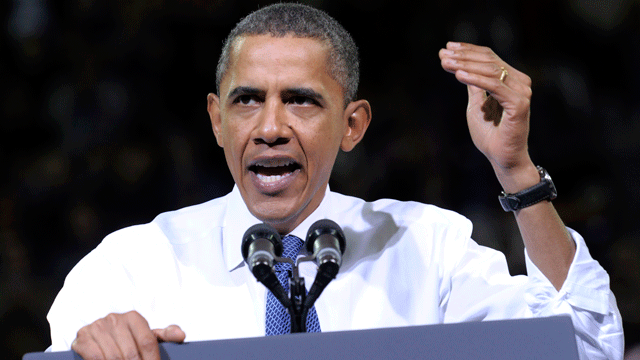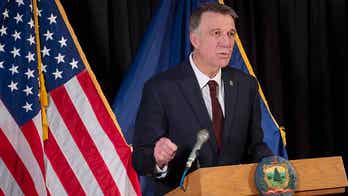
President Obama speaks during a rally for Sen. Patty Murray, D-Wash., Thursday, Oct. 21, 2010, at the University of Washington in Seattle. (AP)
As polls show the nation increasingly disenchanted with President Obama's economic policies, the president on Thursday blamed the lack of support for his sweeping domestic agenda on his sales pitch.
"We had to move so fast, we were in such emergency mode, that it was very difficult for us to spend time a lot doing victory laps and advertising exactly what we were doing because we had to move onto the next thing," he said while campaigning in Seattle.
"I take some responsibility for that," said the president, who is in the midst of a four-day trip through Oregon, Washington, California, Nevada and Minnesota. Obama has vigorously stepped up his campaigning in recent days with fellow Democrats facing the specter of losing control of the House or Senate -- or both -- to Republicans on Nov. 2.
In a question-and-answer session with a group gathered in a Seattle backyard, Obama trumpeted his support for women-owned enterprises and other small businesses as he sought to turn out voters for Washington Sen. Patty Murray.
More broadly, he used his West Coast swing to drive home his challenge to voters to decide, in his words, if they want to stick with progress or return to failure on Election Day.
At a noisy indoor rally in Portland, Ore., Wednesday night for gubernatorial candidate John Kitzhaber, Obama said, "We don't want them rolling back health reform, so insurance companies can deny you coverage because you're sick."
"We don't want them rolling back Wall Street reform, so now credit card companies can go back to hitting you with hidden fees and penalties," he added. "We have tried that before and we're not going back."
That is the message Obama has been stressing for weeks. Aides say he will stick with it throughout his final flurry of campaigning. It is part of a tricky balancing act for the White House -- deploying Obama to the right places to stir up enthusiasm and recruit first-time voters from two years ago, yet trying to keep people from viewing the election as a referendum on him and the battered economy.
Half of likely voters say Obama will have no effect on how they vote in their House races, according to a new Associated Press-GfK poll. Yet almost as many said they will, in fact, base their House vote in part to send a message about Obama -- 26 percent to oppose him, 23 percent to support him.
Less than two weeks from the election, the question appears to be whether Republicans will enjoy a wave election, in which virtually all the close races tip their way and tilt power in Washington, or more moderate gains. Obama's aides profess confidence that Democrats will retain power but know all the factors working against them: near-10 percent unemployment, a history of midterm losses for the party of the president in power and public frustration with the slow economic recovery.
Obama's main roles are to raise money for the party, draw votes and media coverage for candidates in tight races, entice volunteers to knock on doors for scores of lesser-known candidates and try to shape the national election debate. He is intent on drawing a contrast between Democratic and Republican leadership of the country and will repeat it everywhere he goes, based on the assumption that it will be fresh to voters in Minnesota even if he just said it in Maryland.
His 2008 presidential campaign manager, David Plouffe, said Obama may well not be able to change the dynamic of a race in which a candidate is trailing by 8 to 10 points, but he could be a key factor if the margin is 51-49.
"The central actors in the election are the candidates themselves," Plouffe said. "It's how they handle the last two weeks that's most important."
Obama, though, is at the center of reminding voters that this election and the issues it will shape are an extension of his own win in 2008.
"I know that there are times where probably it's hard to recapture that sense of possibility," Obama said in Ohio this week. "It's hard sometimes to say, 'Yes, we can.' You start thinking, 'Well, maybe, I don't know.' It's not as inspiring a slogan. But I said during the campaign, this has never been easy."
The Associated Press contributed to this report.




